What is a schoolchild of 10-11 classes and about the future of the IT community in our country?
I greet the respected IT community Habr!
Spend 30 seconds of your time and think about the names of these projects:
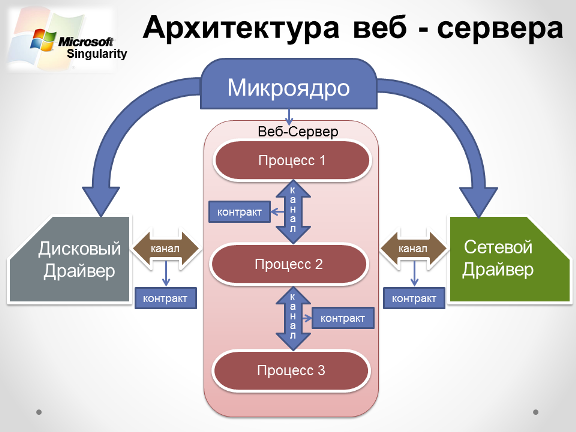
All this is the scientific projects of Russian schoolchildren of 10-11 class.
Immediately it is not easy to believe, but it is.
In this post I want to tell:
We have competitions in our country that help talented schoolchildren reach their potential and support the work on such projects.
One of these contests has already been mentioned at Habré - this is the Baltic Science and Engineering Competition .
The event annually gathers in St. Petersburg more than 300 students from all over Russia and is a qualifying stage for the international competition of young scientists Intel ISEF in the USA, which is very cool .
In this post we will talk about the Baltic competition. Of course, today in grades 10-11 a schoolchild can participate in a huge number of various Olympiads, contests and competitions. To understand why the Baltic competition is worthy of a separate post on Habré, just look at examples of projects from previous years:
')
In this project, a 10th grade student ...
Project presentation for the competition in Russia:
Project stand at the international exhibition Intel ISEF:
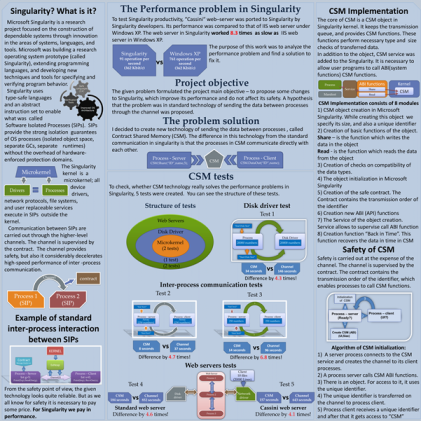
(click to enlarge image)
Report about the student in the news:
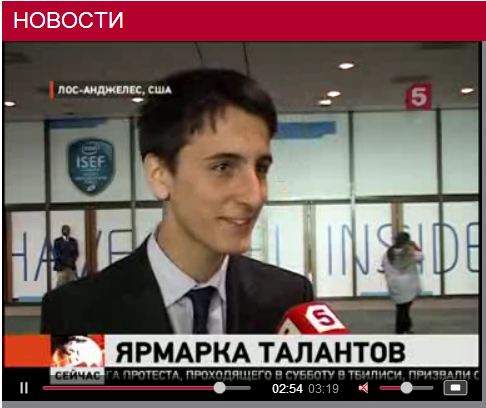
In this project, a schoolchild of 11th grade ...
Project stand for the competition in Russia:
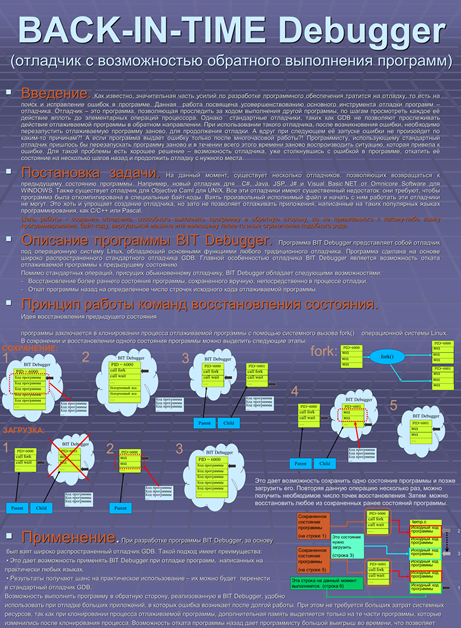
(click to enlarge image)
Project stand at the international exhibition Intel ISEF:
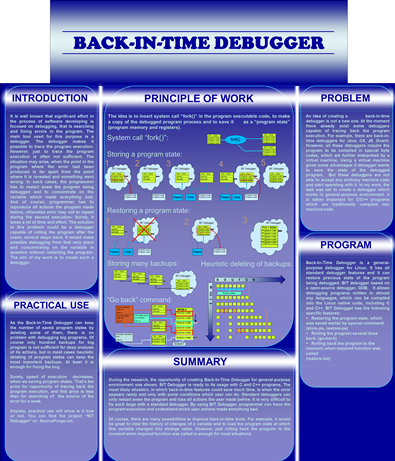
(click to enlarge image)
In this project, a schoolchild of 11th grade ...
Project stand at the international exhibition Intel ISEF:
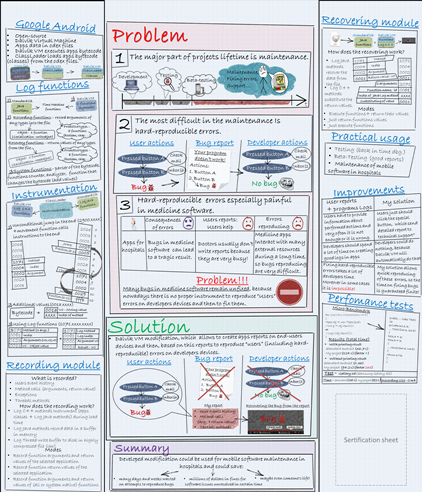
(click to enlarge image)
The above 3 projects were selected only because I am familiar with the students who did these projects. (By the way, the “schoolchildren”, of course, have not been schoolchildren for a long time. By the time of writing this post, one schoolchild has already created from scratch an IT company developing a software product in St. Petersburg that surpasses all existing European analogues and is already sold in the CIS and three European countries). Well, it is clear that quite serious Computer Science projects were chosen that could be of interest to the Habra community.
At the Baltic competition, projects are presented not only in the Computer Science section and not only of this level of complexity. At the contest, you can find both an “English language simulator app for children on flash” from a 9th grader from the village of Baranavichy, and a “universal distributed password cracker” from a 11th grade school student from St. Petersburg (By the way, this “pupil” is also not a schoolboy : in my humble opinion, is one of Peter’s coolest computer security specialists and writes such helpful articles on Habré ).
In addition to Computer Science, in other sections you can find a lot of strong work - here, for example, several names from last year:
Examples of other projects:
The list of works of the winners of the 2013 contest can be found here .
Here you can see an excellent report from the 2010 contest with examples of projects and photos.
Baltic competition - All-Russian. For schoolchildren from the province, the opportunity to speak in front of a scientific jury and communicate with like-minded people is particularly relevant, since at home these guys have virtually no such opportunities. Payment of travel to St. Petersburg and living at the same time for many families presents a significant problem.
For this reason, the organizers of the competition decided to assume such expenses. (the organizer of the competition is one of the mathematical schools of St. Petersburg )
In any normal country, of course, such events should be sponsored by the state.
Alas, in 2014 the Baltic competition did not receive financial support from Russian officials.
In short, the “algorithm” is something like this:
Here is a conditional Ivan Ivanov, a student of the 10th grade from the city of Chelyabinsk.
While all Ivan's friends play World Of Tanks or drink beer in the stairwell, Ivan became interested in programming and wants to develop a modification of Dalvik VM in order to debug Android applications has become more convenient.
Ivan wants to get to St. Petersburg for the competition, so that the result of his sleepless nights will be assessed by professionals of the IT industry, but his family does not have an extra 10,000 rubles to secure the trip.
Today, alas, our officials are not ready to help Ivan.
It is extremely important to understand the fundamental difference between the Baltic competition and others like it from all sorts of programming contests.
At programming contests:
At the Baltic Competition:
No no! The Olympics are good too. A science project is just different.
Why is this “other” important to us? About this further.
I think many community members have a dream of a “bright future,” in which the country where we were born and wrote our first Hello World is not a “raw materials appendage,” but a world leader in innovative developments. When more than 50% of techcranch posts are not about offices from Silicon Valley, but about our startups.
There is no doubt that the main component of success for such a “bright future” is companies that develop something new and something complex . In turn, for such companies to be, we need people who are able to develop something new and something complex.
Contests such as the Baltic - just about that!
Imagine two first-year students. One in the 11th grade was training on hundreds of olympiad tasks, and the other at that time was doing one major project for the Baltic competition.
Which of the two students would you take an internship in an experimental innovation project in your company?
Which of the two students is more likely to become a CTO in the very “next Google” that we are all waiting for?
I think the answer is obvious.
Real software projects that change the world around us are usually not olympiad puzzles, where you need to code something in 10 minutes in an emergency mode. In real projects, we spend hours studying specifications, thinking through complex architectures, understanding other people's code, and so on.
Is it important for our IT community to pay attention to contests in which specialists are born who are able to create something new and complex well?
In my opinion, just needed. Otherwise, one day we will wake up and find that all 50 candidates for a vacancy for our super-project — who must change the world — are only capable of something primitive and one-way. And then all together we will run todry crackers to write here such posts on Habré about the "personnel shortage" .
If the respected member of the IT community Habra reading this post agrees with this statement - for him I will simply leave here a link to the crowdfunding page of the project, on which until January 16 you can support one of these contests. (By the way, this post is in the Crowd Funding hub, which, in theory, allows you to place such a link)
I want to finish on a positive note.
1. Who is from St. Petersburg - on February 5, 2014 at 16-00, come to the Exchange line house 6 to see the projects of schoolchildren at the Baltic competition. Believe, it is VERY important for schoolchildren that YOU appreciate their work and give feedback.
2. I really hope that what I wrote in my post will resonate with the respected Habra community and together we will build a country in which conditional Ivan from Chelyabinsk will become the basis of the very “bright future” in which our country is respected as the world leader in innovative IT developments .
It will not be so easy, but "the road will be mastered by walking."
And finally, a motivating photo of the author of one of the projects discussed at the beginning of the post:
(photo was taken in the USA during the Intel ISEF final)
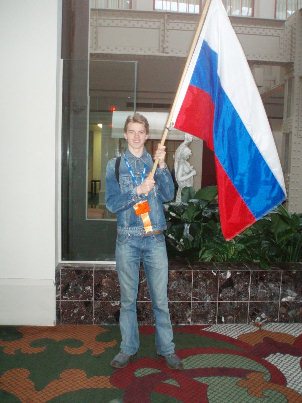
Spend 30 seconds of your time and think about the names of these projects:
- Contract Shared Memory technology in Microsoft Singularity OS
- Back-In-Time Debugger: Linux debugger with the ability to restore the previous state of the program being debugged
- Modifying Dalvik VM for beta testing of Android applications with the ability to play custom actions

All this is the scientific projects of Russian schoolchildren of 10-11 class.
Immediately it is not easy to believe, but it is.
In this post I want to tell:
- where do schoolchildren come from in Russia with such projects and where you can look at all such projects;
- how the future of the IT community in our country depends on all this, in my opinion;
- what each member of this community can do to make this future the way we want it to be.
On a good competition of research projects for schoolchildren
We have competitions in our country that help talented schoolchildren reach their potential and support the work on such projects.
One of these contests has already been mentioned at Habré - this is the Baltic Science and Engineering Competition .
The event annually gathers in St. Petersburg more than 300 students from all over Russia and is a qualifying stage for the international competition of young scientists Intel ISEF in the USA, which is very cool .
In this post we will talk about the Baltic competition. Of course, today in grades 10-11 a schoolchild can participate in a huge number of various Olympiads, contests and competitions. To understand why the Baltic competition is worthy of a separate post on Habré, just look at examples of projects from previous years:
')
Sample Project # 1: Contract Shared Memory Technology in Microsoft Singularity OS
In this project, a 10th grade student ...
- Took Microsoft Singularity, Microsoft's experimental OS
- Analyzed system performance for some tasks.
- Offered a more efficient way to work with memory
- Implemented it, conducted tests, summed up
- Presented a job at the Baltic competition, won a trip to America.
- He presented Russia in America at the international competition Intel ISEF, became the winner (2nd place).
Project presentation for the competition in Russia:
Project stand at the international exhibition Intel ISEF:

(click to enlarge image)
Report about the student in the news:

Project example 2: Back-In-Time Debugger: Linux debugger with the ability to restore the previous state of the program being debugged
In this project, a schoolchild of 11th grade ...
- Developing just4fun toy in C ++, I realized all the “charms” of software debugging. Especially those moments when the cause of the error is somewhere over 10,000 lines to the place where the problem actually appeared. (for example, the memory was “beat” 3 minutes ago, and the Segmentation Fault occurred only now, when they tried to turn to beaten memory)
- I thought up to make a debugger with the ability to roll back the program to the previous state and thus learn how to easily fix hard-to-reproduce bugs.
- Based on the source code of the open source GDB debugger. Collected under Cygwin.
- For 6 (!) Months, unsuccessfully trying to implement a venture from under Windows.
- After 6 months, I decided to try to do it under Linux. Instrumentation was inserted into the executable program code in the memory of the process being debugged “on the fly”, including calling the fork () process's system cloning function . The cloning of the program process made it possible to save the state of the program and roll it back.
- Made a customized version of GDB with additional functions like “restore program state”, put the code on SourceForge .
- Presented a job at the Baltic competition, won a trip to America.
- He presented Russia in America at the international competition Intel ISEF, became the winner (4th place).
Project stand for the competition in Russia:

(click to enlarge image)
Project stand at the international exhibition Intel ISEF:

(click to enlarge image)
Sample project number 3: Modification of Dalvik VM for beta testing of Android applications with the ability to play custom actions
In this project, a schoolchild of 11th grade ...
- For the sake of interest began to develop mobile applications for Android
- During the development process, I ran into the problem that if someone of friends playing with the application suddenly drops the application, it is sometimes quite difficult to reproduce the situation and the debugger cannot be used.
- Inspired by the compatriot project about Back-In-Time debugger. I decided to do something similar for Android applications.
- Made a modification of Dalvik VM (java virtual machine, used in Android), in which the code recording system events and user actions is automatically inserted into the bytecode of the application under test.
- I developed a “player” that allows you to “re-play” the life of an application created by a beta tester using the special log file created in this way. In this case, of course, it is possible to use a debugger.
- Presented a job at the Baltic competition, won a trip to America.
- Represented Russia in America at the international competition Intel ISEF. The main prize did not win, but received good prizes.
Project stand at the international exhibition Intel ISEF:

(click to enlarge image)
Other projects
The above 3 projects were selected only because I am familiar with the students who did these projects. (By the way, the “schoolchildren”, of course, have not been schoolchildren for a long time. By the time of writing this post, one schoolchild has already created from scratch an IT company developing a software product in St. Petersburg that surpasses all existing European analogues and is already sold in the CIS and three European countries). Well, it is clear that quite serious Computer Science projects were chosen that could be of interest to the Habra community.
At the Baltic competition, projects are presented not only in the Computer Science section and not only of this level of complexity. At the contest, you can find both an “English language simulator app for children on flash” from a 9th grader from the village of Baranavichy, and a “universal distributed password cracker” from a 11th grade school student from St. Petersburg (By the way, this “pupil” is also not a schoolboy : in my humble opinion, is one of Peter’s coolest computer security specialists and writes such helpful articles on Habré ).
In addition to Computer Science, in other sections you can find a lot of strong work - here, for example, several names from last year:
Examples of other projects:
- The Yoneda algebra of one of the special binary row algebras
- New type of layered double nickel hydroxide for use in hybrid supercapacitors
- Cohomology of p-groups of manual type representations
- The study of methods of breeding Mytilus Edulis and Mytilus Trossulus mussels with sandpiper (Haemotopys Ostralegus) mussels species in the territory of the Kandalaksha reserve Ryazkov Island
- Synthesis of steroid hormone analogue containing fluorine in position 2
The list of works of the winners of the 2013 contest can be found here .
Here you can see an excellent report from the 2010 contest with examples of projects and photos.
A small spoon A couple of barrels of tar about financing the competition, which I just can't help but say
Baltic competition - All-Russian. For schoolchildren from the province, the opportunity to speak in front of a scientific jury and communicate with like-minded people is particularly relevant, since at home these guys have virtually no such opportunities. Payment of travel to St. Petersburg and living at the same time for many families presents a significant problem.
For this reason, the organizers of the competition decided to assume such expenses. (the organizer of the competition is one of the mathematical schools of St. Petersburg )
In any normal country, of course, such events should be sponsored by the state.
Alas, in 2014 the Baltic competition did not receive financial support from Russian officials.
In short, the “algorithm” is something like this:
- Science Committee does not deal with schoolchildren
- Education Committee does not do science
- The Youth Policy Committee is not engaged in science or schoolchildren, their path is entertainment
- The governor forwards the letters again to the Science Committee.
- goto 1
Here is a conditional Ivan Ivanov, a student of the 10th grade from the city of Chelyabinsk.
While all Ivan's friends play World Of Tanks or drink beer in the stairwell, Ivan became interested in programming and wants to develop a modification of Dalvik VM in order to debug Android applications has become more convenient.
Ivan wants to get to St. Petersburg for the competition, so that the result of his sleepless nights will be assessed by professionals of the IT industry, but his family does not have an extra 10,000 rubles to secure the trip.
Today, alas, our officials are not ready to help Ivan.
Specificity of scientific projects, unlike programming contests
It is extremely important to understand the fundamental difference between the Baltic competition and others like it from all sorts of programming contests.
At programming contests:
- A task that is already 100% solved before you by “smart uncles” is given;
- The task needs to be solved in 10 minutes, the schoolchild should think very quickly, quickly “put out the fires”;
- The quality of the code does not matter. The main thing is to send a file with a task for verification (well, the one that is “task3NewNewNewFinallyWorks.cpp”) and get the cherished “Accepted”;
- Only the basic elements of the language are used: arrays, strings, a pair of standard algorithms.
At the Baltic Competition:
- An open end problem is given. No one really knows what will happen in the end and whether it will turn out at all;
- The task can not be solved in 10 minutes. The task is difficult and, as a rule, a year is done;
- The result of the student is a full-featured software product. A schoolboy is forced to learn to write the project code correctly, to think through the architecture correctly;
- A schoolboy “smokes” 1000 manas to understand complex technologies, and in 90% of cases all this is in English.
No no! The Olympics are good too. A science project is just different.
Why is this “other” important to us? About this further.
About the future of the IT community in our country
I think many community members have a dream of a “bright future,” in which the country where we were born and wrote our first Hello World is not a “raw materials appendage,” but a world leader in innovative developments. When more than 50% of techcranch posts are not about offices from Silicon Valley, but about our startups.
There is no doubt that the main component of success for such a “bright future” is companies that develop something new and something complex . In turn, for such companies to be, we need people who are able to develop something new and something complex.
Contests such as the Baltic - just about that!
Imagine two first-year students. One in the 11th grade was training on hundreds of olympiad tasks, and the other at that time was doing one major project for the Baltic competition.
Which of the two students would you take an internship in an experimental innovation project in your company?
Which of the two students is more likely to become a CTO in the very “next Google” that we are all waiting for?
I think the answer is obvious.
Real software projects that change the world around us are usually not olympiad puzzles, where you need to code something in 10 minutes in an emergency mode. In real projects, we spend hours studying specifications, thinking through complex architectures, understanding other people's code, and so on.
Is it important for our IT community to pay attention to contests in which specialists are born who are able to create something new and complex well?
In my opinion, just needed. Otherwise, one day we will wake up and find that all 50 candidates for a vacancy for our super-project — who must change the world — are only capable of something primitive and one-way. And then all together we will run to
If the respected member of the IT community Habra reading this post agrees with this statement - for him I will simply leave here a link to the crowdfunding page of the project, on which until January 16 you can support one of these contests. (By the way, this post is in the Crowd Funding hub, which, in theory, allows you to place such a link)
Everything will be fine!
I want to finish on a positive note.
1. Who is from St. Petersburg - on February 5, 2014 at 16-00, come to the Exchange line house 6 to see the projects of schoolchildren at the Baltic competition. Believe, it is VERY important for schoolchildren that YOU appreciate their work and give feedback.
2. I really hope that what I wrote in my post will resonate with the respected Habra community and together we will build a country in which conditional Ivan from Chelyabinsk will become the basis of the very “bright future” in which our country is respected as the world leader in innovative IT developments .
It will not be so easy, but "the road will be mastered by walking."
And finally, a motivating photo of the author of one of the projects discussed at the beginning of the post:
(photo was taken in the USA during the Intel ISEF final)

Source: https://habr.com/ru/post/208350/
All Articles